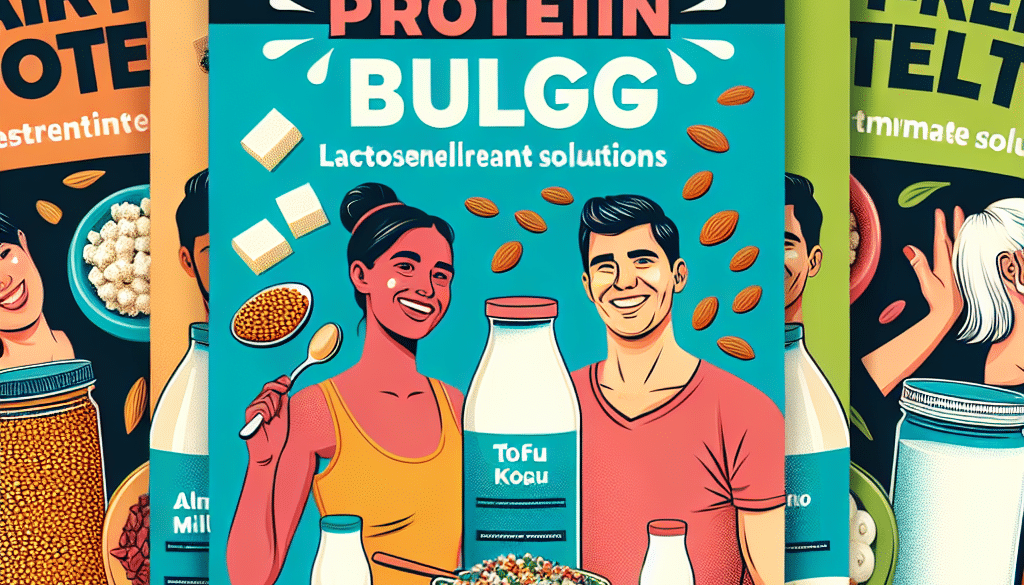Dairy-Free Protein Bulk: Lactose Intolerant Solutions
-
Table of Contents
- Dairy-Free Protein Bulk: Solutions for Lactose Intolerance
- Understanding Lactose Intolerance
- Plant-Based Proteins: A Viable Alternative
- Protein-Rich Vegetables
- Protein Supplements: A Convenient Option
- Case Studies and Statistics
- Meal Planning and Recipes
- Challenges and Considerations
- Conclusion: Embracing Dairy-Free Protein
- ETprotein: Your Dairy-Free Protein Solution
Dairy-Free Protein Bulk: Solutions for Lactose Intolerance

For individuals with lactose intolerance, finding effective ways to meet their protein needs without dairy can be a challenge. Protein is an essential macronutrient vital for muscle repair, immune function, and overall health. Fortunately, there are numerous dairy-free options available that can help lactose-intolerant individuals bulk up on protein without discomfort or health risks. This article explores various dairy-free protein sources, supplementation strategies, and practical tips for incorporating these into a balanced diet.
Understanding Lactose Intolerance
Lactose intolerance is a common digestive issue where the body lacks the enzyme lactase, which is necessary to break down lactose, the sugar found in milk and dairy products. Consuming dairy can lead to symptoms such as bloating, gas, and abdominal pain. As a result, those affected must seek alternative protein sources to avoid these adverse effects.
Plant-Based Proteins: A Viable Alternative
Plant-based proteins have become increasingly popular as a dairy-free alternative. They are not only suitable for those with lactose intolerance but also for vegans and individuals looking to reduce their environmental footprint. Here are some of the top plant-based proteins:
- Legumes: Beans, lentils, and chickpeas are excellent sources of protein and fiber.
- Nuts and Seeds: Almonds, peanuts, chia seeds, and flaxseeds are not only protein-rich but also contain healthy fats.
- Whole Grains: Quinoa, buckwheat, and brown rice provide a decent amount of protein along with essential amino acids.
- Soy Products: Tofu, tempeh, and edamame are complete proteins, meaning they contain all nine essential amino acids.
Protein-Rich Vegetables
While vegetables are not as protein-dense as legumes or nuts, they can still contribute to your protein intake. Broccoli, spinach, and kale are examples of vegetables with higher protein content that can be included in a dairy-free diet.
Protein Supplements: A Convenient Option
Protein powders and supplements can be a convenient way to increase protein intake, especially for those with a busy lifestyle or increased protein requirements. There are several dairy-free protein powders available on the market:
- Pea Protein: Derived from yellow split peas, this is a popular choice for its high protein content and hypoallergenic properties.
- Rice Protein: Made from brown rice, this protein is often combined with pea protein to ensure a complete amino acid profile.
- Hemp Protein: Sourced from hemp seeds, it provides a good balance of omega-3 and omega-6 fatty acids along with protein.
- Pumpkin Seed Protein: This is a newer entrant in the market but is gaining popularity for its nutrient density and protein content.
Case Studies and Statistics
Research has shown that plant-based diets, which are inherently dairy-free, can provide sufficient protein for muscle building and maintenance. A study published in the American Journal of Clinical Nutrition found that plant protein can build muscle just as effectively as animal protein when consumed in adequate amounts. Additionally, the rise in plant-based eating has led to a surge in the availability of high-quality, plant-based protein products, making it easier than ever for those with lactose intolerance to find suitable protein sources.
Meal Planning and Recipes
Integrating dairy-free protein into your diet requires some planning. Here are some meal ideas:
- Breakfast: A smoothie with pea protein powder, spinach, berries, and almond milk.
- Lunch: A quinoa salad with chickpeas, mixed greens, and a variety of colorful vegetables.
- Dinner: Stir-fried tofu with broccoli, bell peppers, and brown rice.
- Snacks: Nut butter on whole-grain toast or a handful of mixed nuts and seeds.
Challenges and Considerations
While there are many dairy-free protein options available, individuals with lactose intolerance should be mindful of their overall nutrient intake. Dairy products are a key source of calcium and vitamin D, so it’s important to find alternative sources of these nutrients, such as fortified plant milks or supplements.
Conclusion: Embracing Dairy-Free Protein
Lactose intolerance doesn’t have to limit your protein intake. With a variety of plant-based proteins and supplements available, it’s possible to achieve a high-protein diet that supports muscle growth and overall health. By incorporating a mix of legumes, nuts, seeds, whole grains, and protein-rich vegetables into your meals, you can ensure a balanced and nutritious diet without dairy.
ETprotein: Your Dairy-Free Protein Solution
If you’re looking for high-quality dairy-free protein options, ETprotein offers a range of organic bulk vegan protein and plant proteins that are perfect for those with lactose intolerance. Their products, including organic rice protein, pea protein, and pumpkin seed protein, are non-GMO, allergen-free, and have a neutral taste, making them an excellent addition to any diet.
About ETprotein:
ETprotein, a reputable protein Chinese factory manufacturer and supplier, is renowned for producing, stocking, exporting, and delivering the highest quality organic bulk vegan protein and plant proteins. They include Organic rice protein, clear rice protein, pea protein, clear pea protein, pumpkin seed protein, sunflower seed protein, mung bean protein, peanut protein etc. Their offerings, characterized by a neutral taste, non-GMO, allergen-free attributes, cater to a diverse range of industries. They serve nutraceutical, pharmaceutical, cosmeceutical, veterinary, as well as food and beverage finished product distributors, traders, and manufacturers across Europe, USA, Canada, Australia, Thailand, Japan, Korea, Brazil, and Chile, among others.
ETprotein specialization includes exporting and delivering tailor-made protein powder and finished nutritional supplements. Their extensive product range covers sectors like Food and Beverage, Sports Nutrition, Weight Management, Dietary Supplements, Health and Wellness Products, and Infant Formula, ensuring comprehensive solutions to meet all your protein needs.
As a trusted company by leading global food and beverage brands and Fortune 500 companies, ETprotein reinforces China’s reputation in the global arena. For more information or to sample their products, please contact them and email sales(at)ETprotein.com today.














